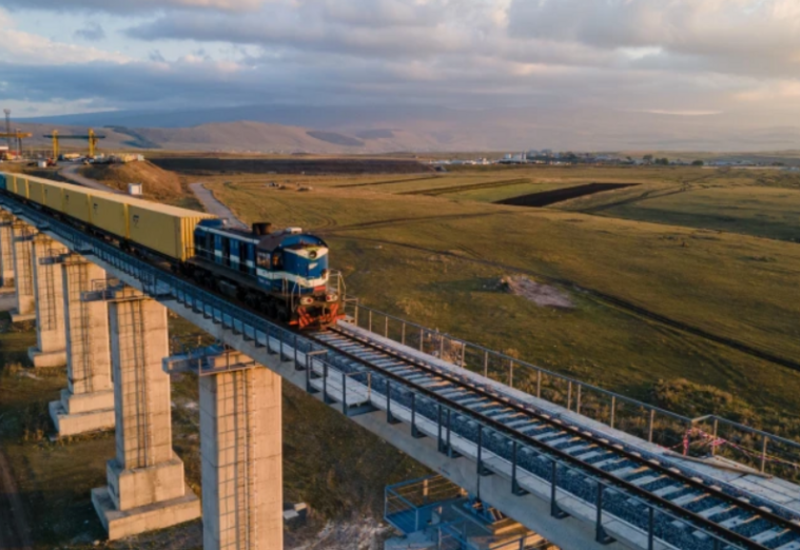|
|
TODAY.AZ / Politics
Major powers fail to settle Iran differences
04 March 2007 [14:00] - TODAY.AZ

"There is still some work to be done on a few outstanding issues, but all parties remain committed to a second resolution in the near future," State Department spokesman Kurtis Cooper said in a statement issued after the five permanent members of the U.N. Security Council and Germany held a conference call to discuss a new U.N. Security Council resolution against Iran.
The United States and leading European countries suspect Iran is seeking to build nuclear weapons under the cover of a civilian atomic program. Tehran denies the charge and says its program is for generating electricity.
The new measures under discussion are a follow-up to a key Security Council resolution passed on December 23 that imposed trade sanctions on sensitive nuclear materials and technology as well as other penalties after Iran refused to suspend uranium enrichment. The sanctions would be suspended if Iran complied.
The State Department put a positive gloss on Saturday's discussions but they appeared to have fallen short of U.S. hopes that the group -- Britain, China, France, Russia and the United States as well as Germany -- would be able to agree on the elements of a resolution during the conference call.
They had a good discussion in keeping with the positive atmosphere of their conversations last week," Cooper said in a brief written statement. "Discussions will now move to New York, where our United Nations permanent representatives (ambassadors) will take up work on the issue."
U.S. and European diplomats have said the new sanctions are expected to include a mandatory travel ban on Iranian officials involved in the nuclear program and an expansion of the list of banned nuclear material and technology Iran may import and export.
Also under consideration is enlarging the list of Iranian officials whose assets were frozen in the December resolution. But envoys said proposals for a total arms embargo would be dropped because of Russian objections as would a ban on visas for students studying nuclear technology abroad.
Negotiators have also discussed restricting export credits provided by governments to companies doing business in Iran. Washington has pushed for Europe to end such credits.
The United States has made no secret of its desire to get a second resolution quickly to keep up momentum in its diplomatic effort to persuade Iran to suspend its nuclear enrichment work, which can provide fuel for power plants or for bombs.
Iran has repeatedly refused to do so.
On Friday, the president of the U.N. Security Council said he expected the 15-member body to have a draft resolution in the coming week on additional sanctions to curb Iran's nuclear ambitions, barring last minute snags.
South Africa's U.N. ambassador, Dumisani Kumalo, who assumed the rotating council presidency, said major powers were trying to include all members in discussions -- unlike last year, when they talked only among themselves until shortly before the vote.
No date has been set for a vote and changes in the language are bound to drag out, but the prediction of a text being circulated in New York next week implied progress among the negotiators.
The U.S. statement made no mention of circulating a draft, saying only that talks would now move to New York. Reuters
URL: http://www.today.az/news/politics/37364.html
 Print version
Print version
Connect with us. Get latest news and updates.
See Also
- 04 February 2026 [13:13]
Armenian emblem with two heads - 04 February 2026 [11:11]
Azerbaijan, Armenia and Masdar - 04 February 2026 [09:33]
President Ilham Aliyev held expanded meeting with Armenian Prime Minister in Abu Dhabi - 03 February 2026 [14:14]
Rumors about the Catholicos’ arrest are circulating in Armenia once again, raising the question of their purpose - 03 February 2026 [12:12]
Zangezur corridor become part of TEN-T: European Union is joining fight for South Caucasus - 03 February 2026 [10:28]
President Ilham Aliyev meets with Secretary General of Muslim Council of Elders in Abu Dhabi - 02 February 2026 [18:03]
Youth Day 2026: Azerbaijan recognizes young achievements - 02 February 2026 [13:13]
The army is being taken away from Etchmiadzin - 01 February 2026 [16:55]
Russia sends new grain shipment to Armenia via Azerbaijan transit route - 31 January 2026 [01:46]
UN Geneva hosts high-level talks on protecting Caspian Sea
Most Popular
 Zangezur corridor become part of TEN-T: European Union is joining fight for South Caucasus
Zangezur corridor become part of TEN-T: European Union is joining fight for South Caucasus
 US moving forces into Middle East - What comes next with Iran?
US moving forces into Middle East - What comes next with Iran?
 The army is being taken away from Etchmiadzin
The army is being taken away from Etchmiadzin
 Slovakia PM adviser quits after Epstein messages surface in newly released US files
Slovakia PM adviser quits after Epstein messages surface in newly released US files
 Grain, fuel and politics of peace: How trade redrawing Armenia–Azerbaijan relations
Grain, fuel and politics of peace: How trade redrawing Armenia–Azerbaijan relations
 SOCAR, Huawei discuss digital transformation and advanced technologies in oil, gas sector
SOCAR, Huawei discuss digital transformation and advanced technologies in oil, gas sector
 New Epstein disclosures shake elites worldwide
New Epstein disclosures shake elites worldwide
